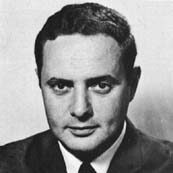Janos Gereben
- 1969

Fellowship Title:
- Social and Political Development in Eastern Europe
Fellowship Year:
- 1969
Possibilities of Regional Development in the Danube Basin – Part I
August 1969 Lerchengasse 28/431080 Wien, Austria BUDAPEST—Benczur utca is a quiet, tree-lined street in the seventh district, home of most of the diplomatic missions to Hungary. The Soviet Embassy is here (guarded by two policemen) as well as the Chinese Embassy (with four of Budapest’s finest). There are no policemen at all in front of No. 25, home of the Danube Commission. It is a small building, housing an international group whose job is to regulate and improve navigation on Central Europe’s major international river, exploit its hydroelectric potential, and plan for the development of a European system of waterways. Austria, Bulgaria, Czechoslovakia, Hungary, Romania, the Soviet Union, and Yugoslavia are its members; West Germany (where the Danube has its source) sends an observer to its meetings. Benczur utca 25 does not need police protection because the Danube Commission is an apolitical, technical and seemingly unimportant group. Yet, within the walls of this unguarded house on that quiet street works an organization which officially keeps alive a century-old dream, one that may yet have an
Impressions of a “Historic Visit”
Lerchengasse 28/431030 Wien, Austria BUCHAREST—That’s what the advance buildup said: “historic.” But now that President Nixon is here, it appears most unlikely that this will be the start of something new—which would be one way to earn that loosely used term. Noisy, yes, and colorful, scary, new for this part of the world, strange, sunny, hot, enthusiastic, sweaty, centrally-organized, but overwhelming, friendly, fun, half-forced, half-voluntary, etc., etc. But what’s so historic about it? President Nixon is here now, he’ll be gone tomorrow and nothing will be changed. “History” is made of stuff more enduring, more significant. What is important then? Moscow needs another Czechoslovakia like Washington needs another Vietnam. This central point of fact is essential to the understanding of Nixon’s visit. This was the factor that allowed the visit to take place at all, and this, too, deprives it from any lasting significance. The visit was possible because of the present new and different situation in the world, and it cannot be historic within the framework of this world situation of mutual mediocrity
Sex and the Single Comrade
July, 1969 Lerchengasse 28/431080 Wien, Austria LJUBLJANA, Yugoslavia—Strip-tease, once scorned in East Europe as capitalist aberration, is all over in the Communist countries while the gentle art of graceful peeling is being replaced in the West by the likes of I Am Curious, be they in shades of yellow, green, or purple. Major hotels, catering to foreigners, all have night clubs in Yugoslavia, Poland, Czechoslovakia, Hungary, Romania, and Bulgaria. The Soviet Union is beginning to catch up (Kiev is now sporting a bona fide “bar” featuring “Gold Ball” cocktails) but still has lady comrades respectfully covered, while East Germany sternly holds the line of that otherwise “oppressor of the people” queen, Victoria. (The East German allowance for what they call “human needs” is in the form of semi-pornographic cartoons and some cheesecake in army papers, but there is little discussion of moral problems in the press other than through criticism of “Western decadence.”) Strip-tease shows, amply advertised in hotel lobbies and in travel literature—with bold but somewhat misleading illustrations—were established in East Europe, notwithstanding puritan
A Slow Season for Marienbad This Year…
PERMANENCE—Statues from the facade of Marienbad’s solid buildings look down on a new, different world whose nostalgia calls for the “reality” of yesteryears. (Photos by Janos Gereben) MARIENSKE-LAZNE, Czechoslovakia—“Last Year in Marienbad” was filmed somewhere else, but its name came from here, this resort town of hot springs where Goethe once lived, where Franz Joseph held court, where Marie Curie studied radioactivity. And it is here—in the town the high society of the Austro-Hungarian Empire knew as Marienbad -that the French film’s message comes home: You should have been here last year. It is the feeling of missing out on something, being short-changed, by visiting at the wrong time. CONTRAST—Young Czechs on 500-year-old Charles Bridge, exhibiting paintings and singing such “revolutionary” songs as tunes from “West Side Story.” The most daring work of art exhibited on the bridge was the Daliesque one by Milan Prahec (opposite page), a student who declined to talk about politics, saying that he is “not interested.” The present is strange, incongruous, “Marienbad” said, but life, real life, was here only
